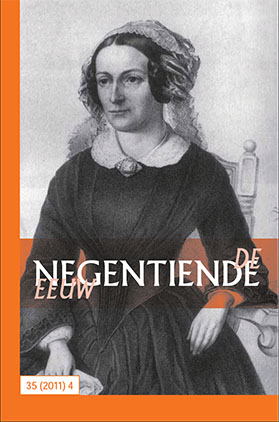Maartje JanseOp de grens tussen staat en civil society. Samenwerking tussen hervormers en politici, 1840-1880 169-187
Abstract (EN)
Where State and Civil Society meet. Cooperation between reformers and politicians, 1840-1880.The relationship between the Dutch state and civil society in the period between 1840 and1880 was harmonious and marked by a cooperative attitude on the part of both reformers and politicians. Before 1840, King William I had controlled associational life to ensure that his policies received support, but after his abdication, and especially after the liberal 1848 constitution, more outspoken reform organizations managed to shape policy-making. For a large part, reform organizations were still immersed in the older deferential political culture, which was intensified by the small scale of the country. Still, reform organizations could operate effectively since their members were closely acquainted with government officials. Using mainly antislavery and temperance as case studies, the article explores the cooperation between government and civil society on specific reform legislation. Finally, the question whether this period can be regarded as an early version of the ‘politics of accomodation’ or the ‘poldermodel’ is addressed and answered negatively.
Rose Spijkerman‘Het is als Ministersvrouw, dat ik u noodig heb’. De politieke betrokkenheid en betekenis van Adelheid Thorbecke-Solger, 1840-1870 188-206
Abstract (EN)
‘It is as a first lady, that I need you’. The political involvement of Adelheid Thorbecke-Solger, 1840-1870.Historians working on nineteenth-century politics and gender usually assume that women exerted no actual influence on national politics. Adelheid Thorbecke- Solger (1817-1870), the wife of J.R. Thorbecke (1798-1872), the most important Dutch statesman of the nineteenth century, has been put in this category. This article challenges this view by analysing her political involvement. On the basis of correspondence, her diary and other accounts, the article illustrates that she was directly involved with her husband’s political career. She supported her husband emotionally, often visited the parliament, assisted Thorbecke by managing his archive and wrote accounts of important political decisions and events. She gathered valuable political information from politicians and even the royal family, which contributed to her husband’s success. She suggested useful people to her husband and, on request, probably used her influence to intercede in both personal and political affairs. Adelheid Thorbecke-Solger is the first wife of a Dutch politician who has been investigated in this light and could therefore serve as an example of a new perspective on the political involvement of nineteenth-century women.
Adelheid CeulemansEen Vlaamse vertegenwoordiger van de Europese romantiek. ‘De geest’, een ‘eigenaerdig’ verhaal van Theodoor Van Ryswyck (1837) 207-221
Abstract (EN)
European Romanticism in early nineteenth-century Flemish literature. ‘De geest’ [‘The ghost’], a peculiar poem of Theodoor Van Ryswyck (1811-1849).This article offers a textual analysis and contextual study of the 1837 narrative poem ‘De geest,’ by Theodoor Van Ryswyck (1811-1849), who is often referred to as the Flemish popular poet par excellence. The analysis of the text shows that Van Ryswyck was acquainted with literary Romanticism and that he applied Romantic ideas and literary features in his poems; he introduced Romanticism into early-nineteenth-century Flemish literature. In addition to its literary pioneering role, ‘De geest’ also had an important cultural-national function in the Belgian nation-state, only seven years old at the time. Together with other texts, for example the works of Conscience, it laid the foundation for the nationaldidactic poetics of nineteenth-century Flemish literature and contributed to the development of a Flemish (sub)national consciousness and identity. This article finally casts doubt on Van Ryswyck’s image as a popular poet.
Boekzaal der geleerde wereld 222-232
- Jouke Turpijn, Mannen van gezag. De uitvinding van de Tweede Kamer 1848-1888. Amsterdam: Wereldbibliotheek, 2008. (Carla Hoetink)
- Annemarie Houkes, Christelijke vaderlanders. Godsdienst, burgerschap en de Nederlandse natie
(1850-1900). Amsterdam: Wereldbibliotheek, 2009. (Peter van Dam) - Wilfried Uitterhoeve, Cornelis Kraijenhoff, 1758-1840. Een loopbaan onder vijf regeervormen. Nijmegen: Vantilt, 2009. (Diederik Smit)
- Janneke van der Heide, Darwin en de strijd om de beschaving in Nederland 1859-1909. Amsterdam: Wereldbibliotheek, 2009. (Christianne Smit)
- Jo Tollebeek, Fredericq & Zonen. Een antropologie van de moderne geschiedwetenschap. Amsterdam:
Bert Bakker, 2008. (Herman Paul) - Coert Peter Krabbe, Droomreis op papier. De Prix de Rome en de Nederlandse architectuur (1808-1851). Leiden: Primavera Pers, 2009. (Petra Brouwer)
- Tom Toremans en Walter Verschueren, red., Crossing cultures. Nineteenth-century Anglophone literature in the Low Countries. Leuven: Leuven University Press 2009. (Lieske Tibbe)

